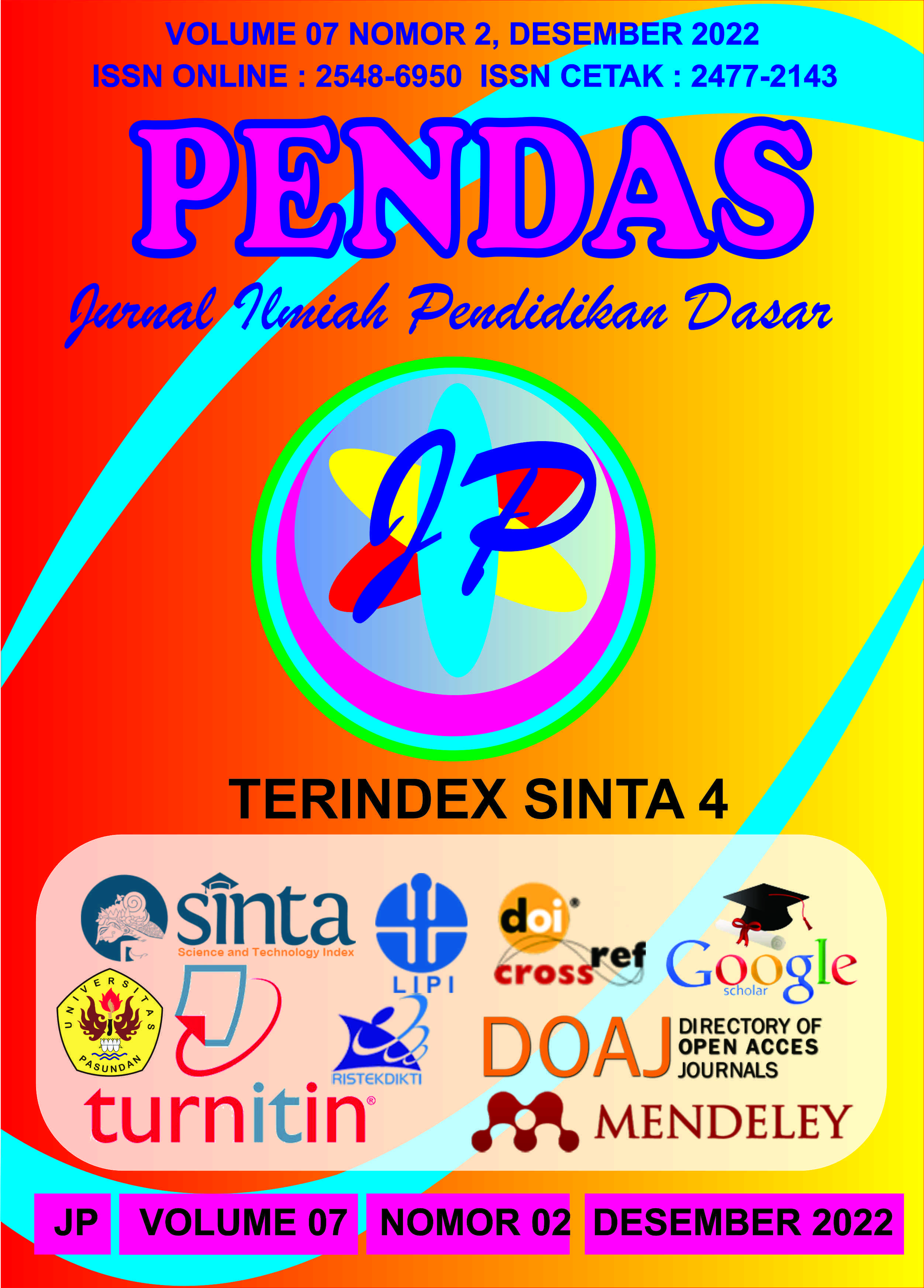PENGARUH MODEL PEMBELAJARAN PROBLEM BASED LEARNING BERBANTUAN PETA KONSEP TERHADAP KEMAMPUAN BERPIKIR KRITIS DAN HASIL BELAJAR ILMU PENGETAHUAN SOSIAL (IPS) MURID KELAS V PADA GUGUS IV LARIANGBANGI MAKASSAR
DOI:
https://doi.org/10.23969/jp.v7i2.6074Keywords:
Kata Kunci: Pembelajaran Berbasis Masalah, Berpikir Kritis, Hasil BelajarAbstract
Pengembangan model pembelajaran sedemikian rupa menarik perhatian para sarjana dan pakar serta memberikan kontribusi terhadap berbagai variasi dan inovasi model dan perangkat pembelajaran. Namun, guru sebagai instrumen pendidikan tetap harus melakukan akselerasi, terutama pada inovasi model pembelajaran. Penelitian ini akan menguji dan pada tahap tertentu, mengusulkan perspektif model pembelajaran berbasis masalah berdasarkan bukti ilmiah dan akurasi statistik, yang oleh karena itu merupakan studi kuantitatif yang mengandalkan pendekatan Quasi-eksperimental. Analisis deskriptif dalam penelitian ini digunakan untuk mendeskripsikan data penelitian yang disajikan dalam bentuk tabel dan untuk memudahkan pembaca dalam mencerna hasil penelitian. Hasil penelitian akan menunjukkan bahwa model pembelajaran berbasis masalah berpengaruh signifikan terhadap keterampilan berpikir kritis, dimana progresivitas terjadi setelah kelas eksperimen menerapkan model pembelajaran berbasis masalah dengan nilai mean 87,50 dan untuk Hasil Belajar sebesar 94,08 dan p-value < 0,001. Sedangkan kelas kontrol yang tidak menerapkan model yang sama menghasilkan nilai rata-rata 43,46 untuk kemampuan berpikir kritis dan 41,50 untuk hasil belajar dengan p-value < 0,001.
Downloads
References
Bahri, S. (2015). Implementasi Pendidikan Karakter dalam Mengatasi Krisis Moral di Sekolah. Ta’allum: Jurnal Pendidikan Islam, 3(1), 57–76. https://doi.org/10.21274/taalum.2015.3.01.57-76
Baudrillard. J. (1983). Simulations. Columbia University New York City, New York 10027 U.S.A, Series: Foreign Agents Series Publisher: Semiotext (e).
Belland, B. R., Gu, J., Kim, N. J., Jaden Turner, D., & Mark Weiss, D. (2019). Exploring epistemological approaches and beliefs of middle school students in problem-based learning. Journal of Educational Research, 112(6), 643–655. https://doi.org/10.1080/00220671.2019.1650701
Block, T., Goeminne, G., & Van Poeck, K. (2018). Balancing the urgency and wickedness of sustainability challenges: three maxims for post-normal education. Environmental Education Research, 24(9), 1424–1439. https://doi.org/10.1080/13504622.2018.1509302
Brooms, D. R. (2022). ‘I didn’t want to be a statistic’: Black males, urban schooling, and educational urgency. Race Ethnicity and Education, 25(3), 351–369. https://doi.org/10.1080/13613324.2020.1803821
D’Alessio, M. A. (2018). The Effect of Microteaching on Science Teaching Self-Efficacy Beliefs in Preservice Elementary Teachers. Journal of Science Teacher Education, 29(6), 441–467. https://doi.org/10.1080/1046560X.2018.1456883
de Ruyter, D. J. (2012). On Optimal Development and Becoming an Optimiser. Journal of Philosophy of Education, 46(1), 25–41. https://doi.org/10.1111/j.1467-9752.2011.00833.x
de Ruyter, D. J. (2015). Well-being and education. In In J. Suissa, C. Winstanly and R. Marples (Eds) Education, Philosophy and Well-Being: New Perspectives on the Work of John White (pp. 84–98). (London, Routledge). https://www.routledge.com/Education-Philosophy-and-Well-being-New-perspectives-on-the-work-of-John/Suissa-Winstanley-Marples/p/book/9781138290884
Demir, Ö., &, & Doğanay, A. (2019). An Investigation of Metacognition, Self-Regulation and Social Intelligence Scales’ Level of Predicting Pre-Service Teachers’ Lifelong Learning Trends. International Journal of Progressive Education, 15(5), 131–148. https://doi.org/10.29329/ijpe.2019.212.10
Diana Putra, I. D. G., Darsana, I. W., & Putra, M. (2019). Pengaruh Model Pembelajaran Berbasis Masalah Berbantuan Peta Konsep Terhadap Kompetensi Pengetahuan IPS. Jurnal Ilmiah Sekolah Dasar, 3(3), 387. https://doi.org/10.23887/jisd.v3i3.19479
Goagoses, N & Koglin, U. (2021). The association between social goals and academic variables in school: a systematic review. Oxford Review of Education, 48(2), 234–251. https://doi.org/https://doi.org/10.1080/03054985.2021.1967117
Hasanah, U., Sarjono, S., & Hariyadi, A. (2021). Pengaruh Model Problem Based Learning Terhadap Prestasi Belajar IPS SMP Taruna Kedung Adem. Aksara: Jurnal Ilmu Pendidikan Nonformal, 7(1), 43. https://doi.org/10.37905/aksara.7.1.43-52.2021
Henschel, S. (2021). Antecedents of science anxiety in elementary school. Journal of Educational Research, 114(3), 263–277. https://doi.org/10.1080/00220671.2021.1922989
Kristjánsson, K. (2017). Recent Work on Flourishing as the Aim of Education: A Critical Review. British Journal of Educational Studies, 65(1), 87–107. https://doi.org/10.1080/00071005.2016.1182115
Lockyer, S., & Weaver, S. (2021). On the importance of the dynamics of humour and comedy for constructionism and reflexivity in social science research methodology. International Journal of Social Research Methodology, 00(00), 1–13. https://doi.org/10.1080/13645579.2021.1926050
Malmia., W, Amir, N., F, Maghfirah, I, & Hentihu, V, R. (2021). PENGARUH PENGUASAAN MATERITURUNAN TERHADAP HASIL BELAJAR INTEGRAL. Uniqbu Journal of Exact Sciences, 2(1), 38–43. https://doi.org/https://doi.org/10.47323/ujes.v2i1.108
Putera, I., B, Nym, S. (2012). Implementasi Problem Based Learning (Pbl) Terhadap Hasil Belajar Biologi Ditinjau Dari Intelligence Quotient (Iq). Jurnal Pendidikan Dan Pembelajaran IPA Indonesia, 2(2).
Reiss, M. J. & White, J. (2013). An Aims-Based Curriculum. In The Significance of Human Flourishing for Schools. (London, Institute of Education Press). https://discovery.ucl.ac.uk/
Scharp, K. M., & Thomas, L. J. (2019). Disrupting the humanities and social science binary: Framing communication studies as a transformative discipline. Review of Communication, 19(2), 147–163. https://doi.org/10.1080/15358593.2019.1595702
Shin, J., Lee, Y. kyung, Park, S., & Seo, E. (2019). Young individuals’ consideration of goal-self alignment and its relations to goal commitment and social concern: age differences and similarities. Self and Identity, 18(6), 650–667. https://doi.org/10.1080/15298868.2018.1510850
Ulya, H., & Rahayu, R. (2021). Mathematical Disposition of Students in Open-Ended Learning Based on Ethnomathematics. Journal of Education Technology, 5(3), 339. https://doi.org/10.23887/jet.v5i3.33535
Webb, M. E., Little, D. R., Cropper, S. J., & Roze, K. (2017). The contributions of convergent thinking, divergent thinking, and schizotypy to solving insight and non-insight problems. Thinking and Reasoning, 23(3), 235–258. https://doi.org/https://doi.org/10.1080/13546783.2017.1295105
Wu, T. T., & Sung, T. W. (2021). Analysis of the effects of a game-based review system integrated with the hierarchy of learning on learning outcomes in an elementary social science course. Interactive Learning Environments, 0(0), 1–21. https://doi.org/10.1080/10494820.2021.1948870
Xu, X., Schönrock-Adema, J., Jaarsma, A. D. C., Duvivier, R. J., & Bos, N. A. (2022). A conducive learning environment in international higher education: A systematic review of research on students’ perspectives. Educational Research Review, 37(July 2021). https://doi.org/10.1016/j.edurev.2022.100474
Zhang, A., Franklin, C., Ji, Q., Chen, Y., Jing, S., & Shen, L. (2018). Evidence-based practice in Chinese social work: overcoming language and developmental barriers. China Journal of Social Work, 11(1), 41–55. https://doi.org/10.1080/17525098.2018.1512621
Zhang, T. (2022). Critical Realism: A Critical Evaluation. Social Epistemology, 00(00), 1–15. https://doi.org/10.1080/02691728.2022.2080127
Zwaal, W. (2019). Assessment for problem-based learning. Research in Hospitality Management, 9(2), 77–82. https://doi.org/10.1080/22243534.2019.1689696
Downloads
Published
Issue
Section
License
Copyright (c) 2022 Pendas : Jurnal Ilmiah Pendidikan Dasar

This work is licensed under a Creative Commons Attribution 4.0 International License.














































